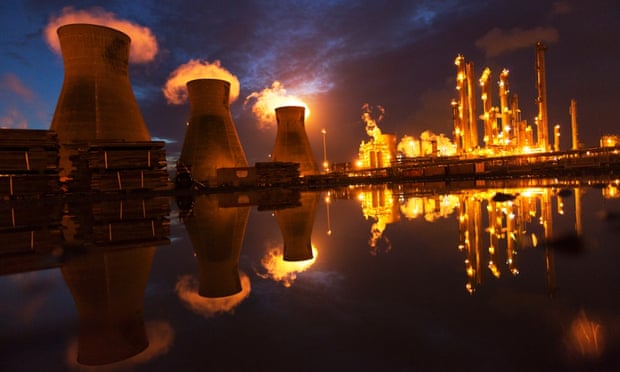It’s not possible to listen to petroleum industry executives defending their reckless extraction of oil without feeling that we are living in an age of madness.
In a recent private conversation under the Chatham House rule, one of the world’s most senior industry leaders, who is considered to be at the more moderate end of the spectrum, insisted that we are going to burn all the world’s hydrocarbons despite the consequences.
His reasoning is that a growing population in the developing world needs energy to raise living standards, that renewables will not become a dominant energy source till the end of the century and that politicians don’t have the courage or power to limit production.
He acknowledged that the burning of all reserves would almost certainly lead to temperature rises of up to 4C, but argued the best way forward is to focus on limiting the damage through such technologies as carbon capture and storage.
He’s hardly alone. In a shareholder letter in May, Shell wrote that – with energy demand growing – the world would need oil and gas for many decades to come and it doesn’t expect to have any stranded assets, or reserves that can’t be tapped. Meanwhile, in a report in March (pdf), ExxonMobil also expressed confidence that none of its hydrocarbon reserves would be stranded: “We believe producing these assets is essential to meeting growing energy demand worldwide.”
As the World Economic Forum’s annual meeting opens in Davos, Switzerland, I asked the former US vice president Al Gore and climate economist Lord Stern, two of the world’s most respected climate activists, to make sense of the arguments of those running the fossil fuel industry.
The simple fact is that their opinions don’t make any sense, Gore told Guardian Sustainable Business. He remembers being astonished by the argument of one oil executive at Davos, who asked: “what good is it to save the earth if humanity suffers?”
Gore, who believes 80% of coal and two thirds of oil must be left untouched if we are to remain within a 2C temperature rise, said: “I had to think long and hard to think what that statement meant. It’s a non sequitur.”
He quoted Sheikh Ahmed Zaki Yamani, a former oil minister in Saudi Arabia, who famously said: “The Stone Age did not end for lack of stone, and the Oil Age will end long before the world runs out of oil.”
As we cross the tipping point where distributive energy sources are available at rates below those for carbon based resources, then this transition [away from petroleum] will become unstoppable,” Gore said. “This will take place; the only question is how quickly.
"It is wishful thinking on the part of the oil company executive you are quoting that it will all be burnt. It cannot all be burnt. Even if there is no government action, the constraints of mother nature will show it is a non-sustainable pathway.”
Lord Stern, who wrote the landmark 2006 Stern review of the economics of climate change, says it is no surprise oil executives are seeking to defend their corner, and quotes socialite Mandy Rice-Davies’ famous response in court to Lord Astor’s denial of any involvement with her: “He would, wouldn’t he?”
Like Gore, Stern said basic arithmetic tells us that it is impossible to burn all the world’s hydrocarbons without devastating consequences.
The earth has not seen a 3C rise for 3m years, he pointed out, and it has been tens of millions of year since there has been a 4C rise.
The consequences, he argued, would be “huge amounts of the world wracked by constant extreme weather”, with some parts of the world turning into desert and others disappearing under water.
" There are many people in the hydrocarbon industry, in oil and gas and coal, who would like to believe they will be the driving force in energy for the next century,” Stern said. “But what they are proposing would be mad and reckless, so the question will be how fast will the pressures be to do something different.
People are recognizing just how dangerous it is and how fast technologies are changing and what they can do on energy efficiency, on solar and with sustainable cities.”
Environmentalist Jonathon Porritt wrote in the Guardian last week that after years of working with oil companies, he is now convinced they will not adapt as a result of being trapped by a short-term mandate that leaves little room for maneuvering, such as shareholder expectations and “the staggering amount of economic value now at risk”.
"This has been quite a painful journey for me personally,” he concluded. “I so badly wanted to believe that the combination of reason, rigorous science and good people would enable elegant transition strategies to emerge in those companies. But we learn as we go. And go those companies surely will, if not in the near future.”
When I asked Gore whether there needs to be more pressure on oil companies to change direction, he said the most effective intervention would be to start putting a financial price on carbon and a political price on denial.
“Companies are insisting on their right to use our atmosphere as an open sewer,” he said. “In London a long time ago, a famous doctor connected the dots between sewage and cholera. We are connecting the dots between dirty energy and dirty weather, and in order to drive the kind of constructive change necessary, we need to put a price on carbon.”
Gore says public pressure for action is essential, which lies behind his announcement at Davos to launch a second round of Live Earth concerts to promote awareness of climate change.
The concerts, which he hopes will make up the largest global campaign in history, will take place across all seven continents – including Antarctica – on 18 June. Gore hopes to collect a billion voices to say “take action now”.

